Book of Numbers - 1
Chris Knepp
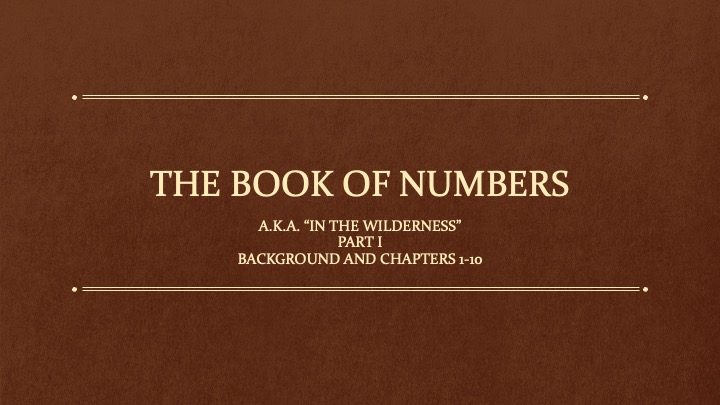
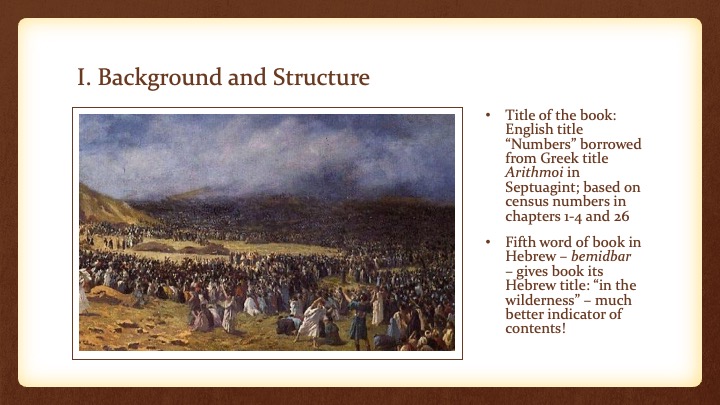
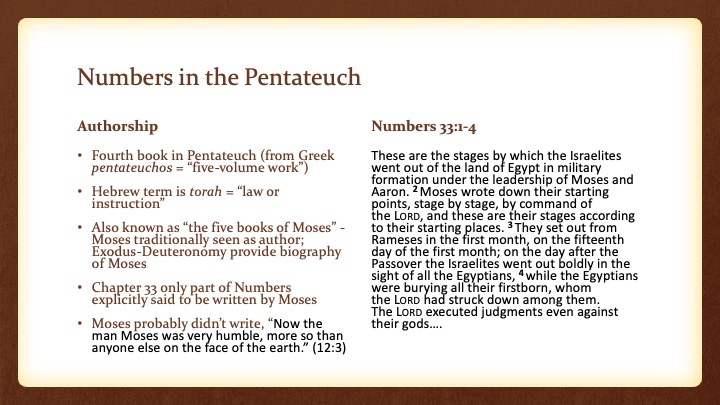
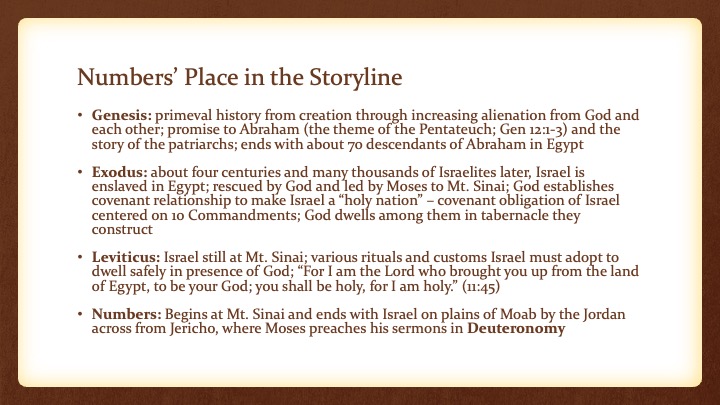
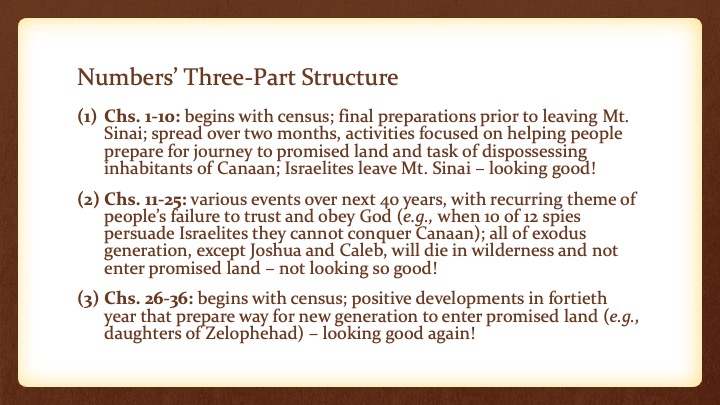
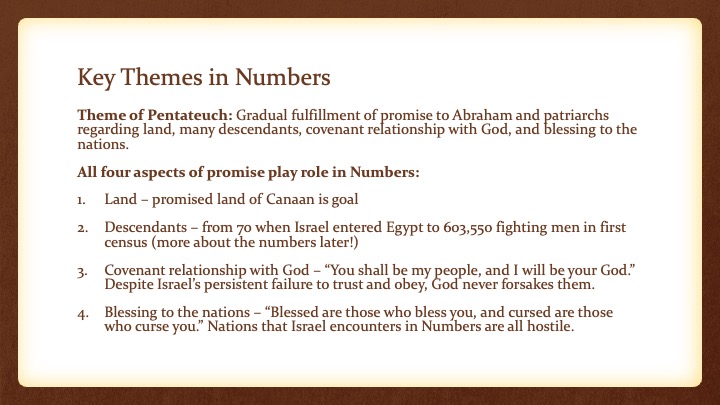
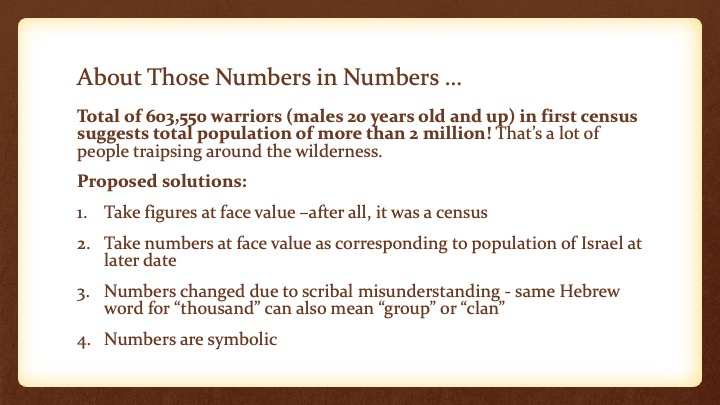
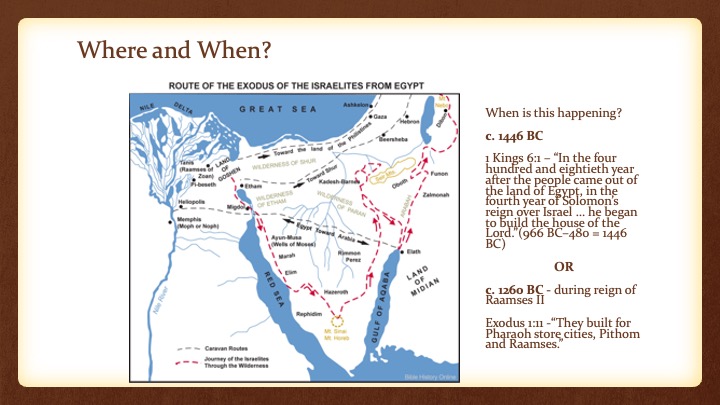
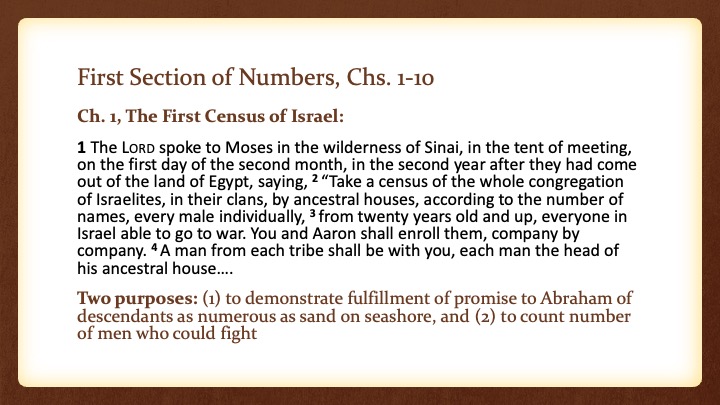
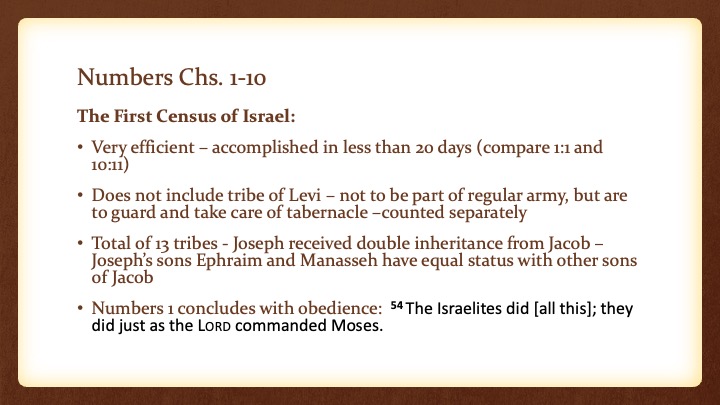

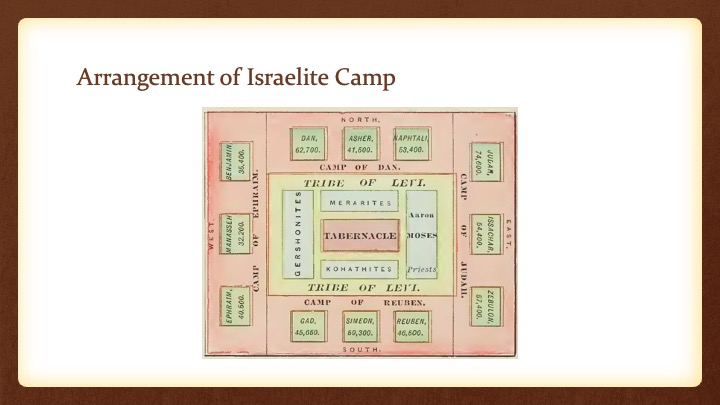
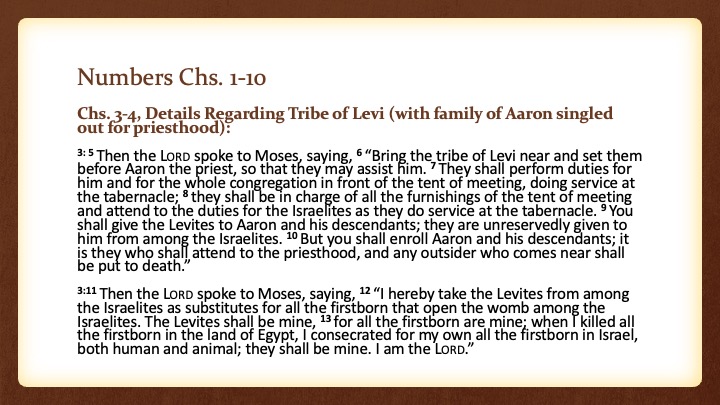
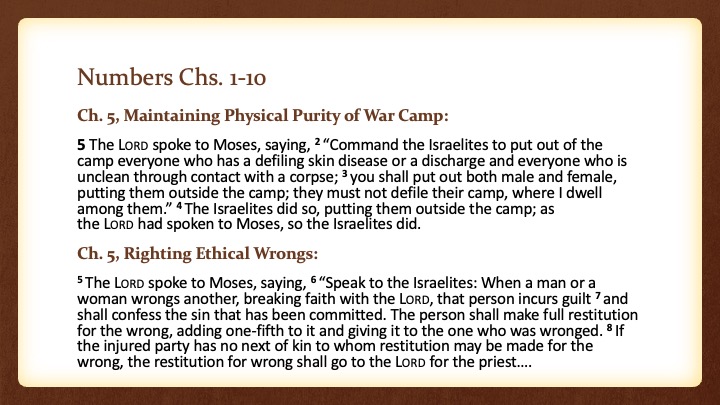
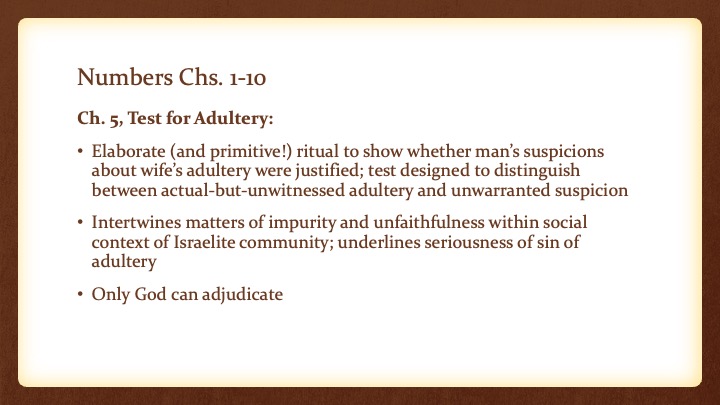
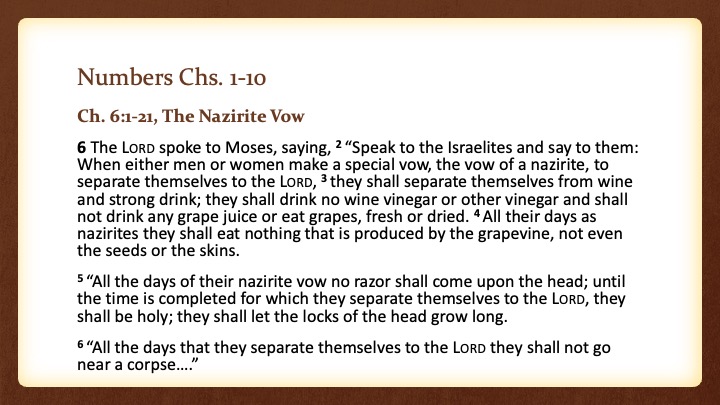
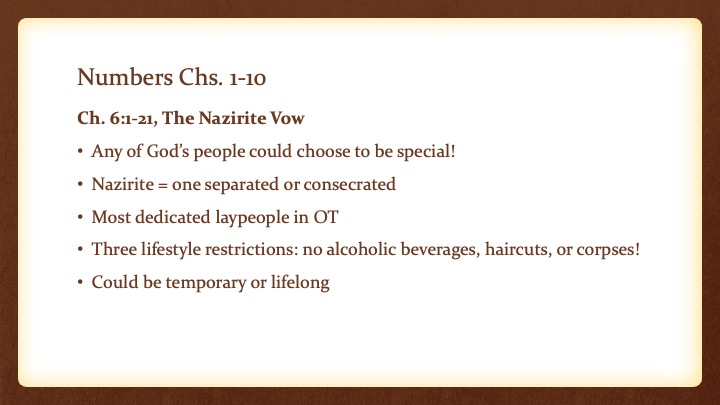
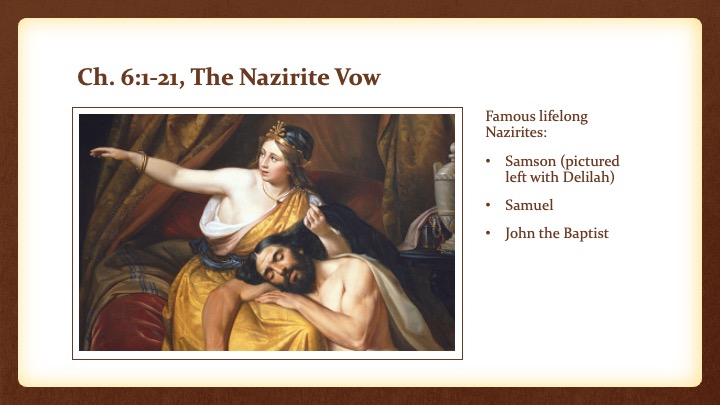
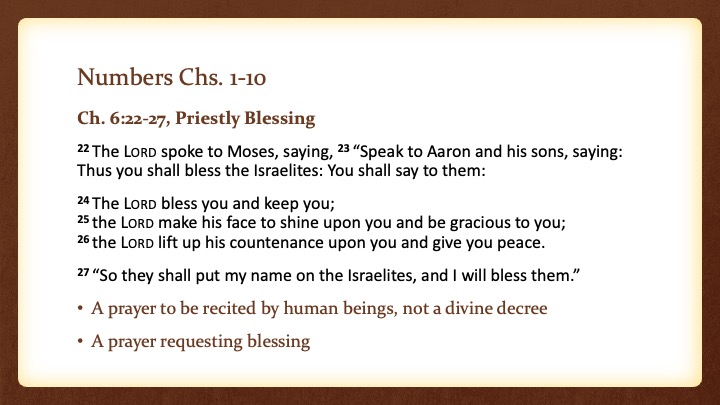
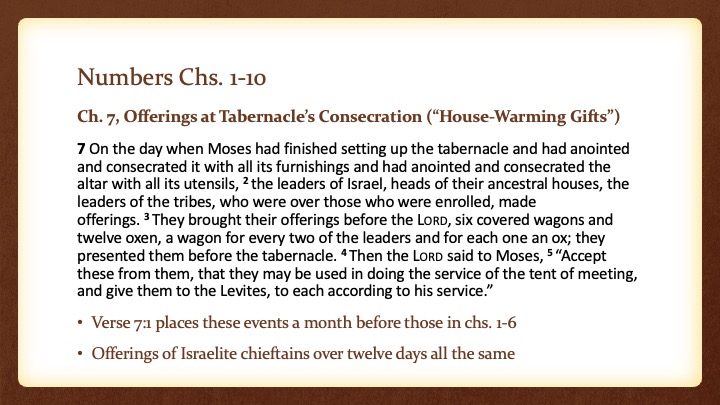
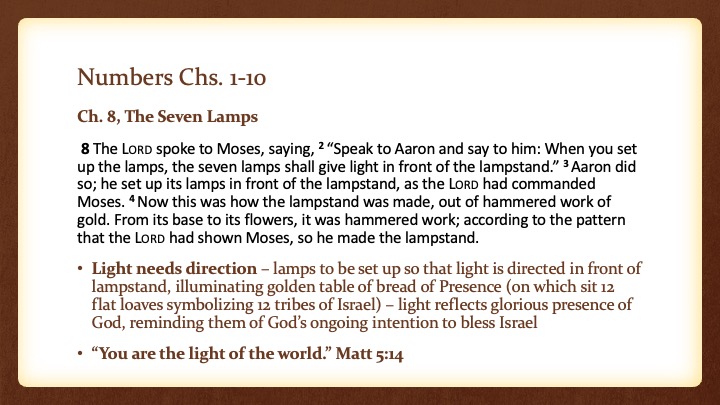
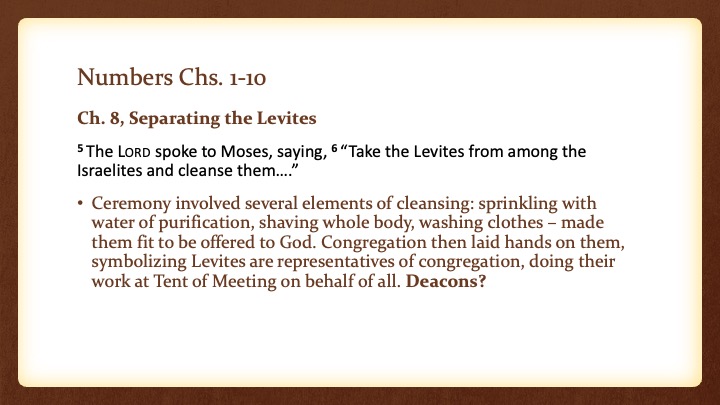
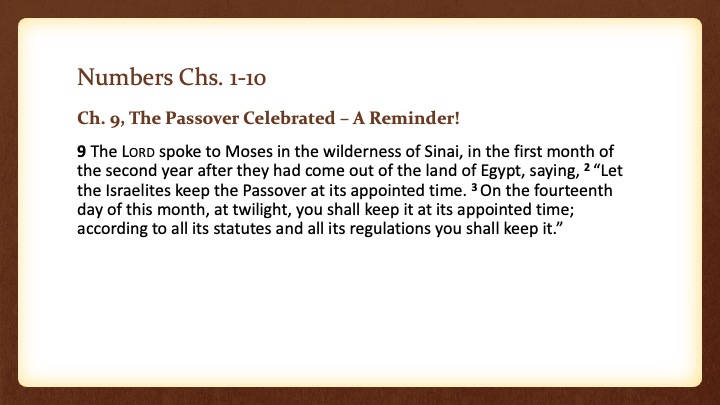
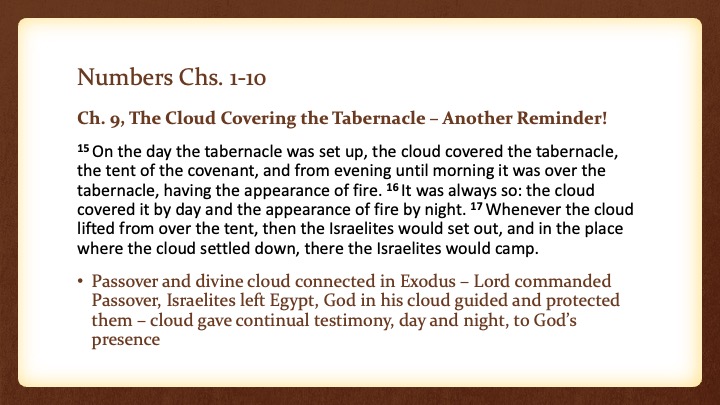
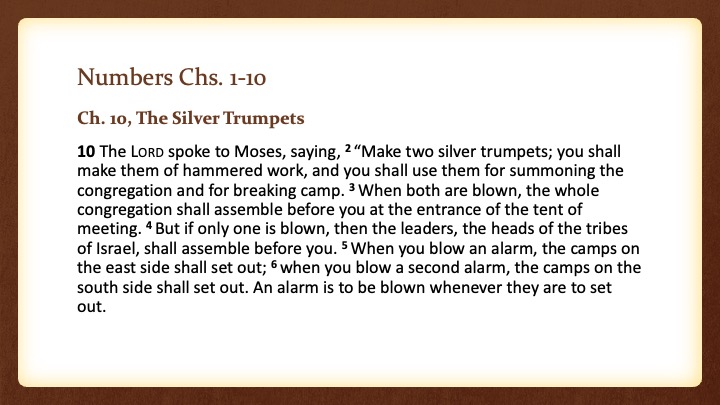
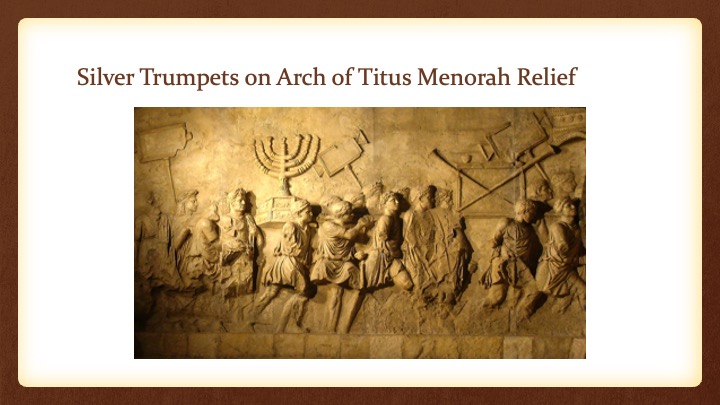
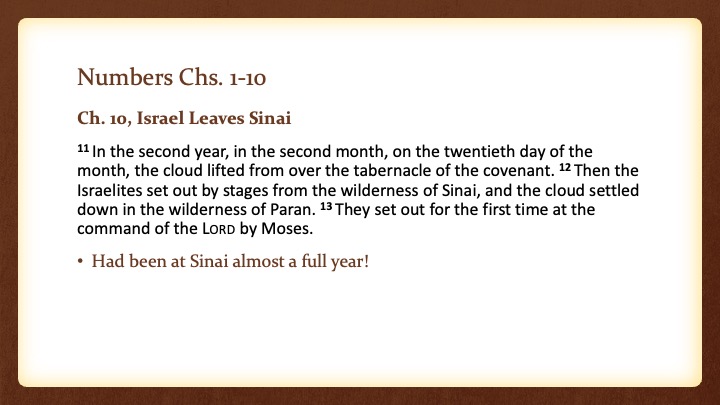
Book of Numbers - 1
Links
< Home Page > < Book of Numbers Menu > < Top of Page >
Book of Numbers Text
The Book of Numbers
Background and Structure
Title of the book: English title “Numbers” borrowed from Greek title Arithmoi in Septuagint; based on census numbers in chapters 1-4 and 26
Fifth word of book in Hebrew – bemidbar – gives book its Hebrew title: “in the wilderness” – much better indicator of contents!
Numbers in the Pentateuch
Authorship
Fourth book in Pentateuch (from Greek pentateuchos = “five-volume work”)
Hebrew term is torah = “law or instruction”
Also known as “the five books of Moses” - Moses traditionally seen as author; Exodus-Deuteronomy provide biography of Moses
Chapter 33 only part of Numbers explicitly said to be written by Moses
Moses probably didn’t write, “Now the man Moses was very humble, more so than anyone else on the face of the earth.” (12:3)
Numbers 33:1-4
These are the stages by which the Israelites went out of the land of Egypt in military formation under the leadership of Moses and Aaron. 2 Moses wrote down their starting points, stage by stage, by command of the Lord, and these are their stages according to their starting places. 3 They set out from Rameses in the first month, on the fifteenth day of the first month; on the day after the Passover the Israelites went out boldly in the sight of all the Egyptians, 4 while the Egyptians were burying all their firstborn, whom the Lord had struck down among them. The Lord executed judgments even against their gods….
The Book of Numbers
Numbers’ Place in the Storyline
Genesis: primeval history from creation through increasing alienation from God and each other; promise to Abraham (the theme of the Pentateuch; Gen 12:1-3) and the story of the patriarchs; ends with about 70 descendants of Abraham in Egypt
Exodus: about four centuries and many thousands of Israelites later, Israel is enslaved in Egypt; rescued by God and led by Moses to Mt. Sinai; God establishes covenant relationship to make Israel a “holy nation” – covenant obligation of Israel centered on 10 Commandments; God dwells among them in tabernacle they construct
Leviticus: Israel still at Mt. Sinai; various rituals and customs Israel must adopt to dwell safely in presence of God; “For I am the Lord who brought you up from the land of Egypt, to be your God; you shall be holy, for I am holy.” (11:45)
Numbers: Begins at Mt. Sinai and ends with Israel on plains of Moab by the Jordan across from Jericho, where Moses preaches his sermons in Deuteronomy
The Book of Numbers
Numbers’ Three-Part Structure
(1) Chs. 1-10: begins with census; final preparations prior to leaving Mt. Sinai; spread over two months, activities focused on helping people prepare for journey to promised land and task of dispossessing inhabitants of Canaan; Israelites leave Mt. Sinai – looking good!
(2) Chs. 11-25: various events over next 40 years, with recurring theme of people’s failure to trust and obey God (e.g., when 10 of 12 spies persuade Israelites they cannot conquer Canaan); all of exodus generation, except Joshua and Caleb, will die in wilderness and not enter promised land – not looking so good!
(3) Chs. 26-36: begins with census; positive developments in fortieth year that prepare way for new generation to enter promised land (e.g., daughters of Zelophehad) – looking good again!
Key Themes in Numbers
Theme of Pentateuch: Gradual fulfillment of promise to Abraham and patriarchs regarding land, many descendants, covenant relationship with God, and blessing to the nations.
All four aspects of promise play role in Numbers:
- Land – promised land of Canaan is goal
- Descendants – from 70 when Israel entered Egypt to 603,550 fighting men in first census (more about the numbers later!)
- Covenant relationship with God – “You shall be my people, and I will be your God.” Despite Israel’s persistent failure to trust and obey, God never forsakes them.
- Blessing to the nations – “Blessed are those who bless you, and cursed are those who curse you.” Nations that Israel encounters in Numbers are all hostile.
About Those Numbers in Numbers …
Total of 603,550 warriors (males 20 years old and up) in first census suggests total population of more than 2 million! That’s a lot of people traipsing around the wilderness.
Proposed solutions:
- Take figures at face value –after all, it was a census
- Take numbers at face value as corresponding to population of Israel at later date
- Numbers changed due to scribal misunderstanding - same Hebrew word for “thousand” can also mean “group” or “clan”
- Numbers are symbolic
The Book of Numbers
Where and When?
When is this happening?
c. 1446 BC
1 Kings 6:1 – “In the four hundred and eightieth year after the people came out of the land of Egypt, in the fourth year of Solomon’s reign over Israel … he began to build the house of the Lord.”(966 BC–480 = 1446 BC)
OR
c. 1260 BC - during reign of Raamses II
Exodus 1:11 -“They built for Pharaoh store cities, Pithom and Raamses.”
First Section of Numbers, Chs. 1-10
Ch. 1, The First Census of Israel:
1 The Lord spoke to Moses in the wilderness of Sinai, in the tent of meeting, on the first day of the second month, in the second year after they had come out of the land of Egypt, saying, 2 “Take a census of the whole congregation of Israelites, in their clans, by ancestral houses, according to the number of names, every male individually, 3 from twenty years old and up, everyone in Israel able to go to war. You and Aaron shall enroll them, company by company. 4 A man from each tribe shall be with you, each man the head of his ancestral house….
Two purposes: (1) to demonstrate fulfillment of promise to Abraham of descendants as numerous as sand on seashore, and (2) to count number of men who could fight.
Numbers Chs. 1-10
The First Census of Israel:
• Very efficient – accomplished in less than 20 days (compare 1:1 and 10:11)
• Does not include tribe of Levi – not to be part of regular army, but are to guard and take care of tabernacle –counted separately
• Total of 13 tribes - Joseph received double inheritance from Jacob – Joseph’s sons Ephraim and Manasseh have equal status with other sons of Jacob
• Numbers 1 concludes with obedience: 54 The Israelites did [all this]; they did just as the Lord commanded Moses.
Ch. 2, The Arrangement of the Camp:
2 The Lord spoke to Moses and Aaron, saying, 2 “The Israelites shall camp each in their respective regiments, under ensigns by their ancestral houses; they shall camp facing the tent of meeting on every side.
• 12 tribes (excludes Levites) divided into four groups of three each; each group occupies one of four directions of compass, beginning with east and going clockwise
• Encampment arranged as square, with Lord’s sanctuary (Tent of Meeting) and Levites in center – like Egyptian war camp, but God, not Pharaoh, in center!
• Order of encampment corresponds to marching order, with Levites and sanctuary in middle between groups 2 and 3 (to protect from attack) – can “hit the road” or set up camp efficiently - God of order and efficiency!
Chs. 3-4, Details Regarding Tribe of Levi (with family of Aaron singled out for priesthood):
3: 5 Then the Lord spoke to Moses, saying, 6 “Bring the tribe of Levi near and set them before Aaron the priest, so that they may assist him. 7 They shall perform duties for him and for the whole congregation in front of the tent of meeting, doing service at the tabernacle; 8 they shall be in charge of all the furnishings of the tent of meeting and attend to the duties for the Israelites as they do service at the tabernacle. 9 You shall give the Levites to Aaron and his descendants; they are unreservedly given to him from among the Israelites. 10 But you shall enroll Aaron and his descendants; it is they who shall attend to the priesthood, and any outsider who comes near shall be put to death.”
3:11 Then the Lord spoke to Moses, saying, 12 “I hereby take the Levites from among the Israelites as substitutes for all the firstborn that open the womb among the Israelites. The Levites shall be mine, 13 for all the firstborn are mine; when I killed all the firstborn in the land of Egypt, I consecrated for my own all the firstborn in Israel, both human and animal; they shall be mine. I am the Lord.”
Ch. 5, Maintaining Physical Purity of War Camp:
5 The Lord spoke to Moses, saying, 2 “Command the Israelites to put out of the camp everyone who has a defiling skin disease or a discharge and everyone who is unclean through contact with a corpse; 3 you shall put out both male and female, putting them outside the camp; they must not defile their camp, where I dwell among them.” 4 The Israelites did so, putting them outside the camp; as the Lord had spoken to Moses, so the Israelites did.
The Book of Numbers
Ch. 5, Righting Ethical Wrongs:
5 The Lord spoke to Moses, saying, 6 “Speak to the Israelites: When a man or a woman wrongs another, breaking faith with the Lord, that person incurs guilt 7 and shall confess the sin that has been committed. The person shall make full restitution for the wrong, adding one-fifth to it and giving it to the one who was wronged. 8 If the injured party has no next of kin to whom restitution may be made for the wrong, the restitution for wrong shall go to the Lord for the priest….
Ch. 5, Test for Adultery:
• Elaborate (and primitive!) ritual to show whether man’s suspicions about wife’s adultery were justified; test designed to distinguish between actual-but-unwitnessed adultery and unwarranted suspicion
• Intertwines matters of impurity and unfaithfulness within social context of Israelite community; underlines seriousness of sin of adultery
• Only God can adjudicate
Ch. 6:1-21, The Nazirite Vow
6 The Lord spoke to Moses, saying, 2 “Speak to the Israelites and say to them: When either men or women make a special vow, the vow of a nazirite, to separate themselves to the Lord, 3 they shall separate themselves from wine and strong drink; they shall drink no wine vinegar or other vinegar and shall not drink any grape juice or eat grapes, fresh or dried. 4 All their days as nazirites they shall eat nothing that is produced by the grapevine, not even the seeds or the skins.
5 “All the days of their nazirite vow no razor shall come upon the head; until the time is completed for which they separate themselves to the Lord, they shall be holy; they shall let the locks of the head grow long.
6 “All the days that they separate themselves to the Lord they shall not go near a corpse….”
Ch. 6:1-21, The Nazirite Vow
• Any of God’s people could choose to be special!
• Nazirite = one separated or consecrated
• Most dedicated laypeople in OT
• Three lifestyle restrictions: no alcoholic beverages, haircuts, or corpses!
• Could be temporary or lifelong
Famous lifelong Nazirites:
• Samson (pictured left with Delilah)
• Samuel
• John the Baptist
Ch. 6:22-27, Priestly Blessing
22 The Lord spoke to Moses, saying, 23 “Speak to Aaron and his sons, saying: Thus you shall bless the Israelites: You shall say to them:
24 The Lord bless you and
keep you;
25 the Lord make his face to shine upon you
and be gracious to you;
26 the Lord lift up his countenance upon you
and give you peace.
27 “So they shall put my name on the Israelites, and I will bless them.”
• A prayer to be recited by human beings, not a divine decree
• A prayer requesting blessing
The Book of Numbers
Ch. 7, Offerings at Tabernacle’s Consecration (“House-Warming Gifts”)
7 On the day when Moses had finished setting up the tabernacle and had anointed and consecrated it with all its furnishings and had anointed and consecrated the altar with all its utensils, 2 the leaders of Israel, heads of their ancestral houses, the leaders of the tribes, who were over those who were enrolled, made offerings. 3 They brought their offerings before the Lord, six covered wagons and twelve oxen, a wagon for every two of the leaders and for each one an ox; they presented them before the tabernacle. 4 Then the Lord said to Moses, 5 “Accept these from them, that they may be used in doing the service of the tent of meeting, and give them to the Levites, to each according to his service.”
• Verse 7:1 places these events a month before those in chs. 1-6
• Offerings of Israelite chieftains over twelve days all the same
Ch. 8, The Seven Lamps
8 The Lord spoke to Moses, saying, 2 “Speak to Aaron and say to him: When you set up the lamps, the seven lamps shall give light in front of the lampstand.” 3 Aaron did so; he set up its lamps in front of the lampstand, as the Lord had commanded Moses. 4 Now this was how the lampstand was made, out of hammered work of gold. From its base to its flowers, it was hammered work; according to the pattern that the Lord had shown Moses, so he made the lampstand.
• Light needs direction – lamps to be set up so that light is directed in front of lampstand, illuminating golden table of bread of Presence (on which sit 12 flat loaves symbolizing 12 tribes of Israel) – light reflects glorious presence of God, reminding them of God’s ongoing intention to bless Israel
• “You are the light of the world.” Matt 5:14
Ch. 8, Separating the Levites
5 The Lord spoke to Moses, saying, 6 “Take the Levites from among the Israelites and cleanse them….”
• Ceremony involved several elements of cleansing: sprinkling with water of purification, shaving whole body, washing clothes – made them fit to be offered to God. Congregation then laid hands on them, symbolizing Levites are representatives of congregation, doing their work at Tent of Meeting on behalf of all. Deacons?
The Book of Numbers
Ch. 9, The Passover Celebrated – A Reminder!
9 The Lord spoke to Moses in the wilderness of Sinai, in the first month of the second year after they had come out of the land of Egypt, saying, 2 “Let the Israelites keep the Passover at its appointed time. 3 On the fourteenth day of this month, at twilight, you shall keep it at its appointed time; according to all its statutes and all its regulations you shall keep it.”
Ch. 9, The Cloud Covering the Tabernacle – Another Reminder!
15 On the day the tabernacle was set up, the cloud covered the tabernacle, the tent of the covenant, and from evening until morning it was over the tabernacle, having the appearance of fire. 16 It was always so: the cloud covered it by day and the appearance of fire by night. 17 Whenever the cloud lifted from over the tent, then the Israelites would set out, and in the place where the cloud settled down, there the Israelites would camp.
• Passover and divine cloud connected in Exodus – Lord commanded Passover, Israelites left Egypt, God in his cloud guided and protected them – cloud gave continual testimony, day and night, to God’s presence
The Book of Numbers
Ch. 10, The Silver Trumpets
10 The Lord spoke to Moses, saying, 2 “Make two silver trumpets; you shall make them of hammered work, and you shall use them for summoning the congregation and for breaking camp. 3 When both are blown, the whole congregation shall assemble before you at the entrance of the tent of meeting. 4 But if only one is blown, then the leaders, the heads of the tribes of Israel, shall assemble before you. 5 When you blow an alarm, the camps on the east side shall set out; 6 when you blow a second alarm, the camps on the south side shall set out. An alarm is to be blown whenever they are to set out.
Ch. 10, Israel Leaves Sinai
11 In the second year, in the second month, on the twentieth day of the month, the cloud lifted from over the tabernacle of the covenant. 12 Then the Israelites set out by stages from the wilderness of Sinai, and the cloud settled down in the wilderness of Paran. 13 They set out for the first time at the command of the Lord by Moses.
• Had been at Sinai almost a full year!